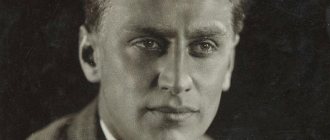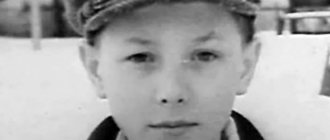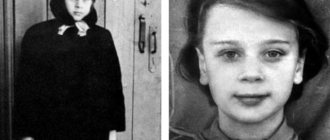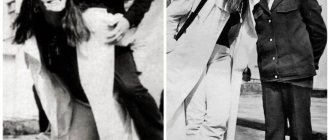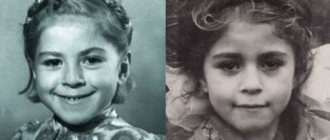Biography
Alexander Blok was born in 1880 in St. Petersburg into an intelligent and educated family: his father was a professor of legal sciences, and his mother was a translator and writer. The boy’s parents separated a year after his birth, but, despite the fact that he remained with his mother, A.A. Beketova, Alexander inherited his father’s surname, under which he is still known to the reader.
Blok spent his childhood on the estate of his maternal grandfather, in Shakhmatovo. He grew up surrounded by care: in addition to his mother, his grandmother, great-grandmother, aunts, nannies and grandfather looked after him. The grandfather instilled in his grandson a love of ships, which he carried throughout his life: Beketov often showed the boy how ships floated down the river, and they watched them together. His mother introduced him to poetry and sparked a love for literature.
Blok received an excellent education: from the second year he studied at the Vvedenskaya Gymnasium, which he successfully graduated from, and then entered St. Petersburg University. At first, he followed in his father’s footsteps to the Faculty of Law, but soon realized that his soul lay with someone else, and three years later he transferred to the Faculty of History and Philology, namely the Slavic-Russian department. The rector of the university at that time was the poet’s grandfather, A. N. Beketov. During his student years, Blok became interested in theater and tried himself as an actor.
In 1903, Blok married L.D. Mendeleeva, the daughter of the famous physicist. They were together for 18 years.
Blok served as a timekeeper in the engineering and construction unit and was drafted into the army in 1916.
He accepted the revolution with enthusiasm, despite the fact that he was kept under arrest due to charges of anti-Soviet conspiracy and collaboration with the Essers. The writer was quickly released thanks to Lunacharsky, who stood up for the poet. But gradually the delight gave way to disappointment, as it became clear what the revolution brought with it: hunger, poverty, fear and uncertainty.
Blok died in 1921, the cause of death being heart failure. Towards the end of his life, the writer also had mental problems: he was delirious and certainly wanted to destroy all the manuscripts of the poem “The Twelve”. Alexander Blok was buried at the Volkovskoye cemetery; after his death, his body was cremated. Blok’s death, which happened in the same year as Gumilyov’s execution, was called by many the end of the Silver Age in Russian literature.
Brief biography of Blok. Early years
Before we begin to analyze the poems of Alexander Blok and the features of his work, it is useful to pay attention to the biography of the poet. Blok was born on November 16, 1880. The mother of the poet Alexander Beketov left the family immediately after the birth of her son due to a difficult relationship with her husband, Alexander Lvovich Blok. In 1889, she married a guards officer and settled with the baby on the banks of the Bolshaya Nevka in the vicinity of what was then St. Petersburg.
Blok himself began writing poetry at the age of five. At the age of 9 he was sent to study at a gymnasium, where he remained until 1898. In 1897, the future poet experienced his first love. The object of young Bok’s passion turned out to be Ksenia Sadovskaya. His feelings did not fade for several years, which gave rise to several lyrical poems. At the age of 17, Blok became interested in theater. The poet seriously intended to become an actor. In 1989, he meets Lyubov Mendeleeva, the granddaughter of the great scientist, whom he then takes as his wife.
In 1901, the poet was transferred to the philological faculty of St. Petersburg University. At this time, he creates a large number of poems - about nature, love, and the Motherland. In the spring of 1903, his works were published for the first time in the magazine “New Way”.
The events of 1905 had a great influence on him. The poet recognizes himself as a citizen and takes part in demonstrations. Revolutionary sentiments are reflected in the creativity of this stage.
Creation
Blok wrote his first poems at the age of 5; they were cute quatrains about animals and the world around him. At the age of nine, the boy published a small handwritten collection “Ship”, which he dedicated to his beloved mother.
Blok's first serious book was “Poems about a Beautiful Lady” (1904). It reflected the basic principles of philosophy and perception of the poet’s work.
Blok, especially his early work, was greatly influenced by the symbolist theorist V.S. Solovyov. Of his predecessors, Blok was guided by Zhukovsky, Pushkin and Polonsky.
Blok’s most controversial work is probably the poem “The Twelve.” She really liked it and inspired ordinary people: workers and military personnel, but it caused misunderstanding among the friends of the bloc. Zinaida Gippius, having read the poem, called Blok a traitor.
Alexander Blok's last public performance took place at the Bolshoi Theater and seemed to be a premonition of imminent death: the atmosphere was so gloomy and depressing that one of those present compared the creative meeting with a wake.
Blok’s last poem, which summed up his work, was “Scythians” (1918).
"Poems about a beautiful lady"
In 1898, Alexander Blok entered the university and studied there for quite a long time, because he transferred from the Faculty of Law to the Faculty of Philology; Therefore, he received his diploma only in 1906, when he was already a famous poet. He began writing poetry very early. In 1900 he was already an original poet, both in style and in essence. At first his poems were not published. Only in 1903 several poems were published in Merezhkovsky's magazine New Way. In 1904 they were published as a separate book called Poems about a Beautiful Lady. Blok always insisted that his poetry could only be truly understood and appreciated by those who sympathized with his mysticism. This statement is especially true when it comes to his first book. If the reader does not understand the mystical “background”, the poems will seem to him simply verbal music. To be understood, these verses must be interpreted. This, however, is not a very difficult task if you use Blok’s own article On the Current State of Russian Symbolism (1910) - his very important self-disclosure - and Andrei Bely’s detailed commentary in his wonderful Memoirs of Blok.
Poems about a beautiful lady are a mystical “love story” with the Person, whom Blok identified with the heroine of Solovyov’s Three Visions - Sophia, Divine Wisdom, the female hypostasis of the Divine. Blok's mystic friends, and he himself, always insisted that these Poems were the most important part of his work, and although the average reader may prefer the powerful poetry of his third volume, these early Poems are, of course, very interesting and biographically important. Despite the influence of Vladimir Solovyov (material) and Zinaida Gippius (metric form), they are quite original and stylistically strangely mature for a 20-22 year old. The main feature of this poetry is complete freedom from everything sensual and concrete. This is a vagueness of words that acts on the unprepared reader simply like verbal music. Like no other, this poetry responds to Verlaine’s rule: “de la musique avant toute chose” (“music, music first of all!”). There is nothing in the world “plus vague et plus soluble dans l’air” (“more vague and more soluble in the air”) than this collection. Later, in the play The Stranger, Blok forces the Poet (who is undoubtedly a self-parody) to read his poems to a sexton in a tavern, and he delivers his verdict: “It’s unclear, sir, but very sophisticated, sir!” Apart from a few initiates, the attitude of his then fans towards Blok was in many ways similar to the attitude of gender.
Block. Biography, lyrics. Video tutorial
The further popularity of his early poetry (contained in the first volume of his works) was precisely caused by the craze for poetry that would be as pure and free of content as music.
At first, only a few appreciated Blok’s poetry. Critics either did not pay attention to her, or treated her with ridicule and indignation, which was the common lot of symbolists. They began to read Blok much later. But literary circles immediately understood the significance of the new poet: Bryusov and Merezhkovsky received him very warmly. The younger Symbolists went even further in their enthusiasm: two young Muscovites, Andrei Bely and Sergei Solovyov (son of M. S. Solovyov) saw in his poetry a message close to their own spiritual mood. Blok became for them a prophet and seer, almost the founder of a new religion. These young mystics with ardent faith expected a new religious revelation, and Blok’s ethereal poetry seemed to them the Annunciation of a new era. In his Memoirs, Bely describes the tense atmosphere of mystical expectation in which the young Bloks (the poet and his wife, L. D. Mendeleeva), himself and Sergei Solovyov lived in 1903–1904.
Four muses of Alexander Blok
That Beautiful Lady was Lyubov Mendeleeva, the daughter of the famous Russian chemist. Lyubov Dmitrievna was both Muse and wife for Blok. However, no matter how strong his love for his wife was, Blok was also interested in other women. Today “RG” remembers those who became the poet’s Muse.
Ksenia Sadovskaya
Blok met Ksenia Mikhailovna at the German resort of Bad Nauheim in 1897. This was his first love, which left a deep mark on the poet’s work. Sadovskaya was 22 years older than Blok. The holiday romance was stormy, and then developed into a long-term relationship; The 16-year-old boy experienced the entire spectrum of a man’s feelings for a woman - from ardent love and awkward embarrassment to rage and hatred.
Blok in love wrote:
“On such a night I managed to recognize, With the sounds of night and spring, the embrace of a beautiful woman in the rays of a lifeless moon.”
Twelve years later, when rumors about Sadovskaya’s death reach him, the poet will speak unflatteringly about his first love: “However, who died? The old woman died. What's left? Nothing. May she rest in peace."
However, despite the residue left after the separation, Blok found a place for warm feelings in his poems:
“Life has long been burned and told, Only the first love is dreamed of, Like a priceless casket, tied Crosswise with a scarlet ribbon, like blood. And when in the silence of my upper room, under the lamp, I languish from resentment, the blue ghost of a dead lover shines through the censer of dreams.”
Lyubov Mendeleeva
Lyubov Mendeleeva
The daughter of the famous chemist Dmitry Mendeleev, at the age of sixteen, was known as a beauty. They had known Blok since childhood, but a new meeting turned the poet’s world upside down - he met the Muse, the Beautiful Lady, Love. And this relationship was the opposite of his affair with Sadovskaya.
I enter dark temples and perform a poor ritual. There I am waiting for the Beautiful Lady in the flickering red lamps.
In the shadow of a high column I tremble from the creaking of the doors. And looking into my face, illuminated, is only an image, only a dream about Her.
Oh, I'm used to these robes of the Majestic Eternal Wife! Smiles, fairy tales and dreams run high along the cornices.
Oh, Holy One, how tender the candles are, How joyful are Your features! I can’t hear neither sighs nor speeches, But I believe: Darling - You.
They married in 1903. At first, Blok saw his Ideal and idolized her. And this was a problem in their relationship. Blok believed that the Muse should remain the Muse, and there is no need for physical intimacy. The wife was confused. Especially considering Blok’s hobbies for others. But Lyubov Dmitrievna did not go unnoticed: Blok’s “colleagues in the shop” - Soloviev and Bely - looked after her. And Blok’s feelings are seething again.
Natalia Volokhova
Natalia Volokhova
Blok met the actress of the troupe Vera Komissarzhevskaya during the preparation for the production of the play “Balaganchik” (1906). It is in this drama that the conflict between the poet and Andrei Bely, who claimed the heart of Lyubov Dmitrievna, is described. The relationship between the spouses by this time had practically gone wrong...
Blok was crazy about the spectacular brunette, sent her flowers and poems, sat in her dressing room, and met her after performances. There are rumors that he was ready to divorce for Volokhova’s sake, but this novel ended along with the cycle of poems “Snow Mask”.
“I entered the lower world as if I were entering a box. The excited theater went out and I alone disturbed the darkness with the living fire of winged eyes.
They sing from the dark box: “Find. Love. Take it. Drag away." And all who are powerful and insignificant will lower their swords before me.”
Lyubov Andreeva-Delmas
Blok met the opera singer in March 1913. Their houses were next door. The Blocks then lived in an apartment building on Ofitserskaya Street. For several months they were inseparable, they even performed together - he read poetry, she sang romances.
“Oh yes, love is free like a bird, Yes, it doesn’t matter - I’m yours! Yes, I will still dream about Your camp, your fire!
Yes, in the predatory power of beautiful hands, In the eyes where the sadness of betrayal is, All the delirium of my vain passions, My nights, Carmen!
However, they separated in 1914, when Blok yearned for his wife, who, unable to withstand her husband’s love affairs, went to the front as a nurse.
After the return of Lyubov Dmitrievna, Blok calmed down; he no longer let his wife leave him and was faithful to her until his death in 1921. Lyubov Dmitrievna outlived her husband by 18 years.
